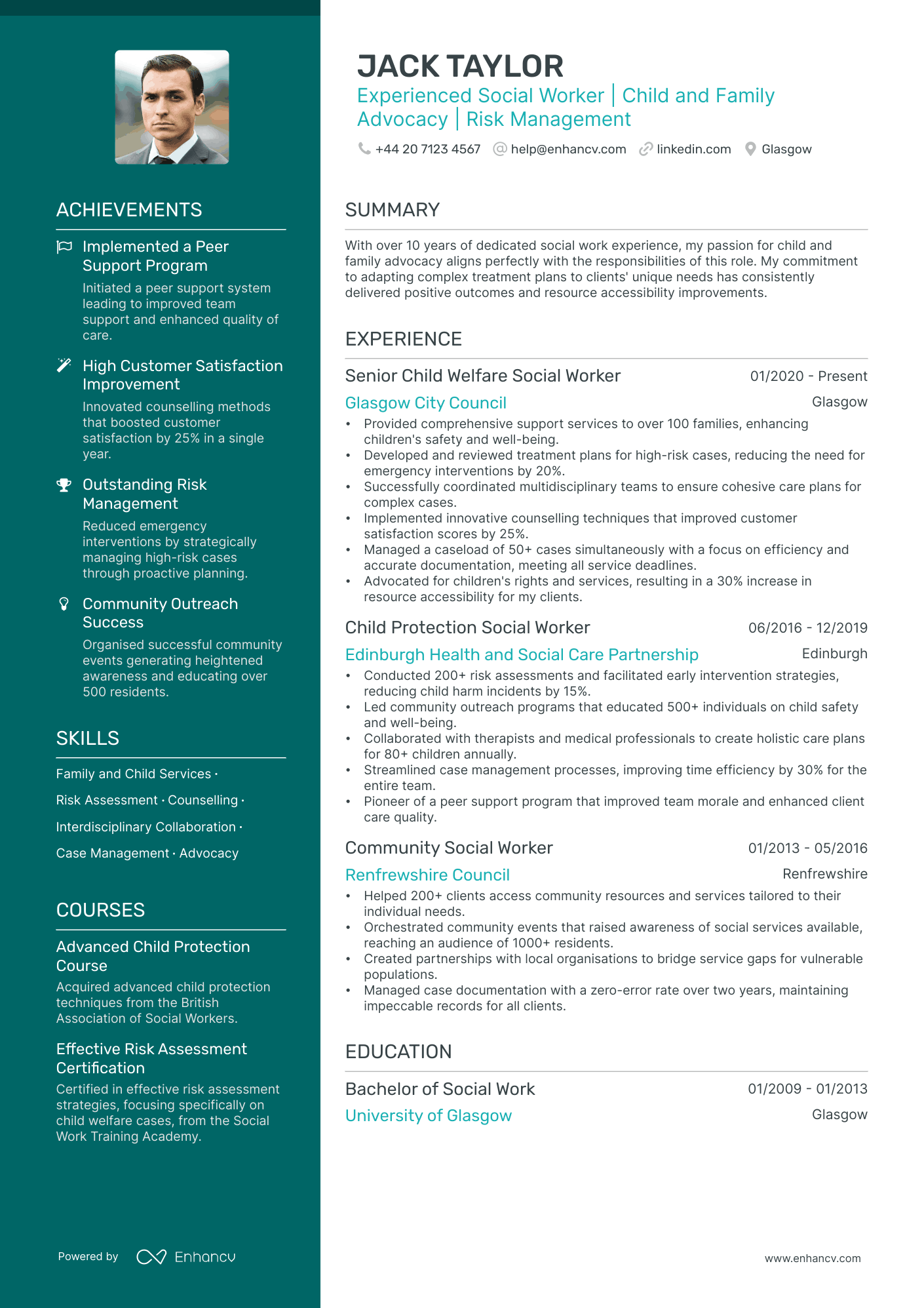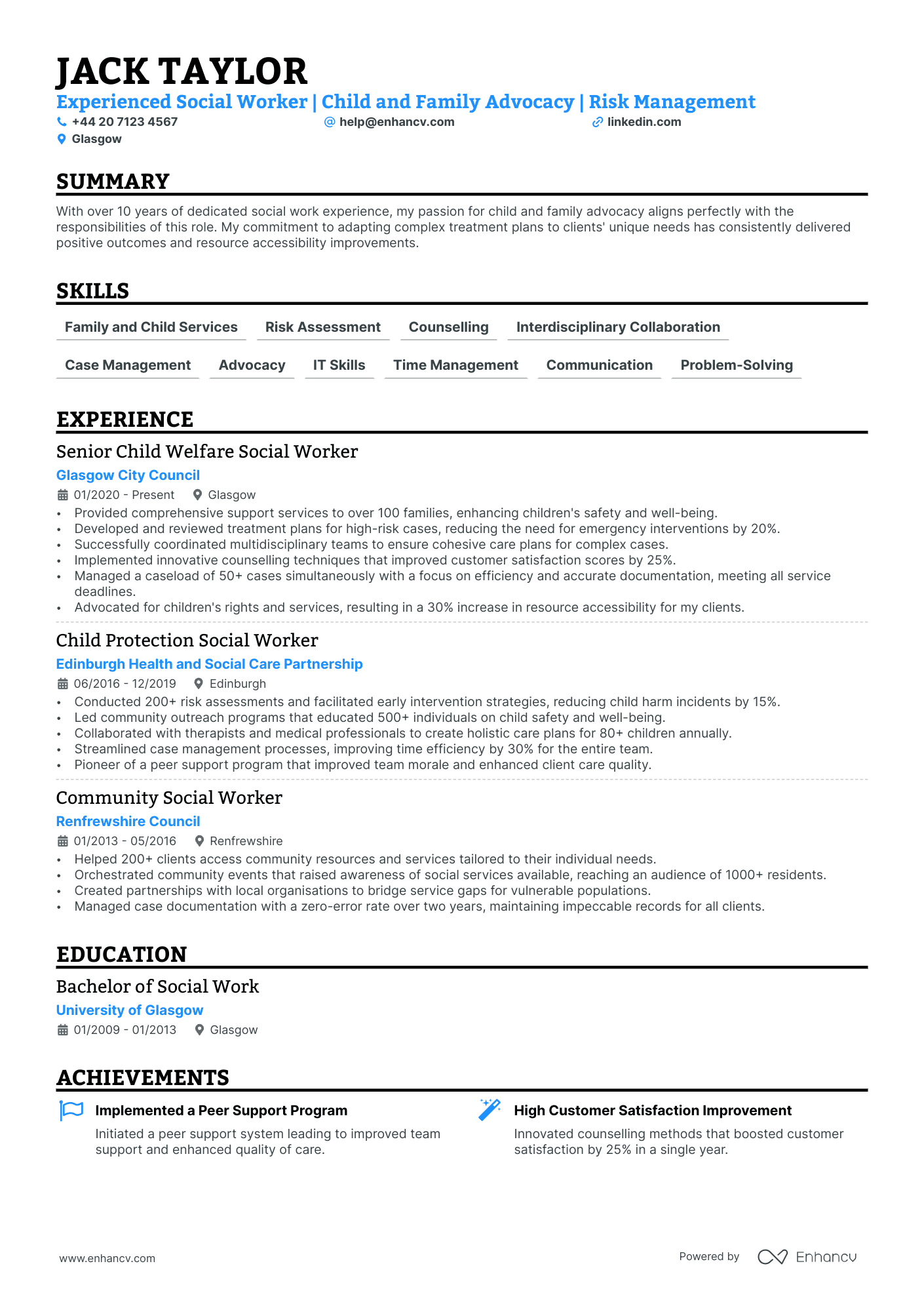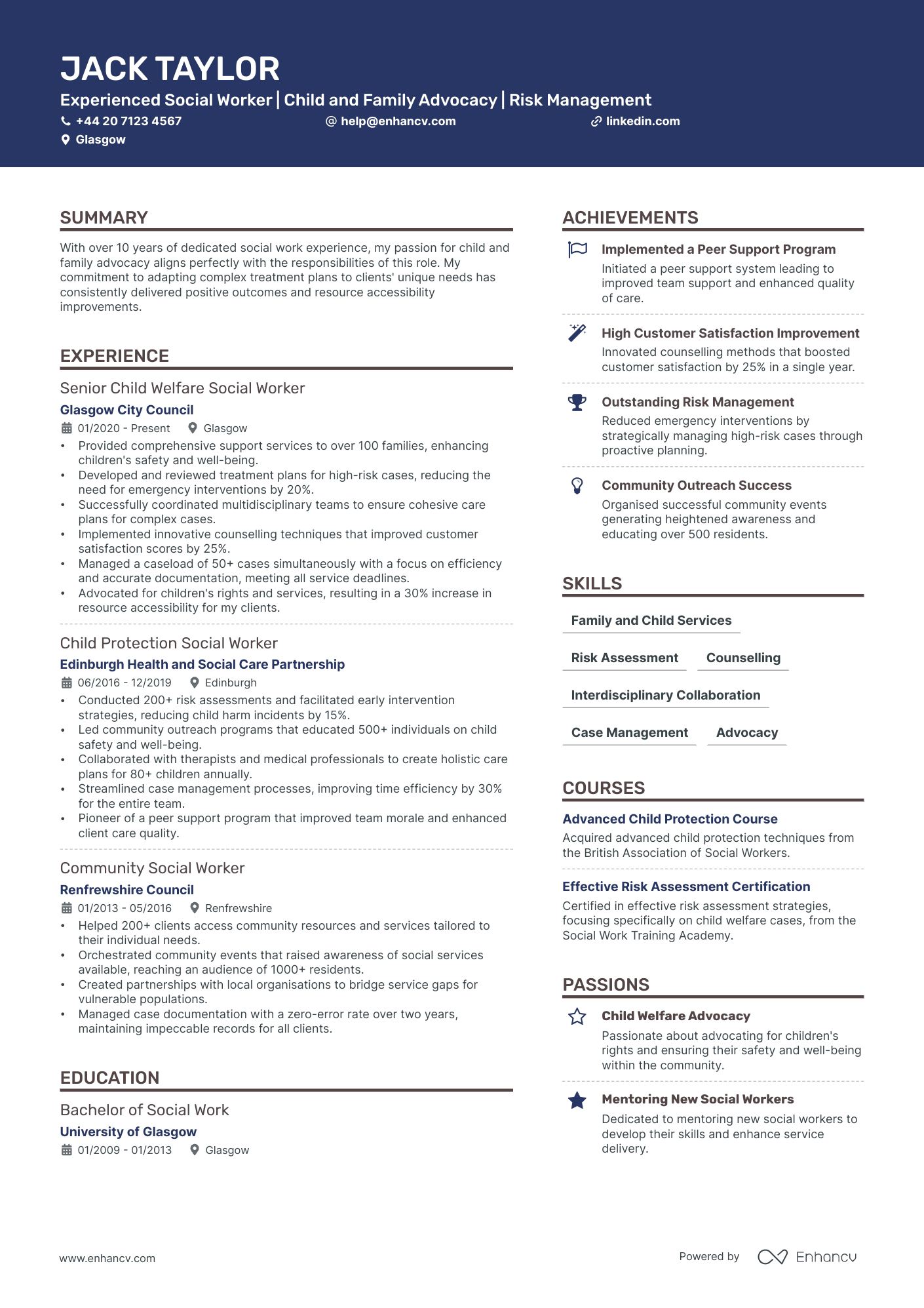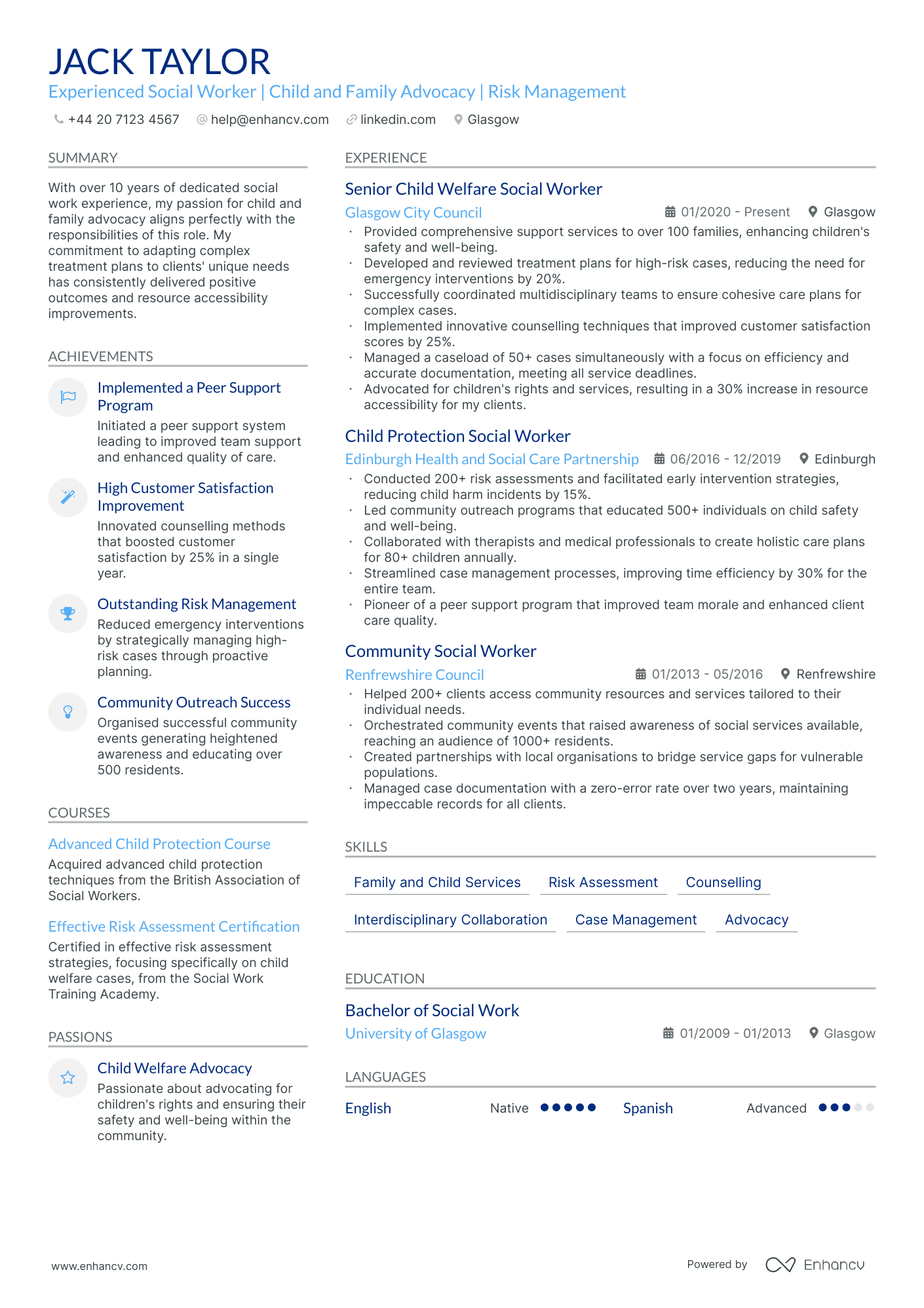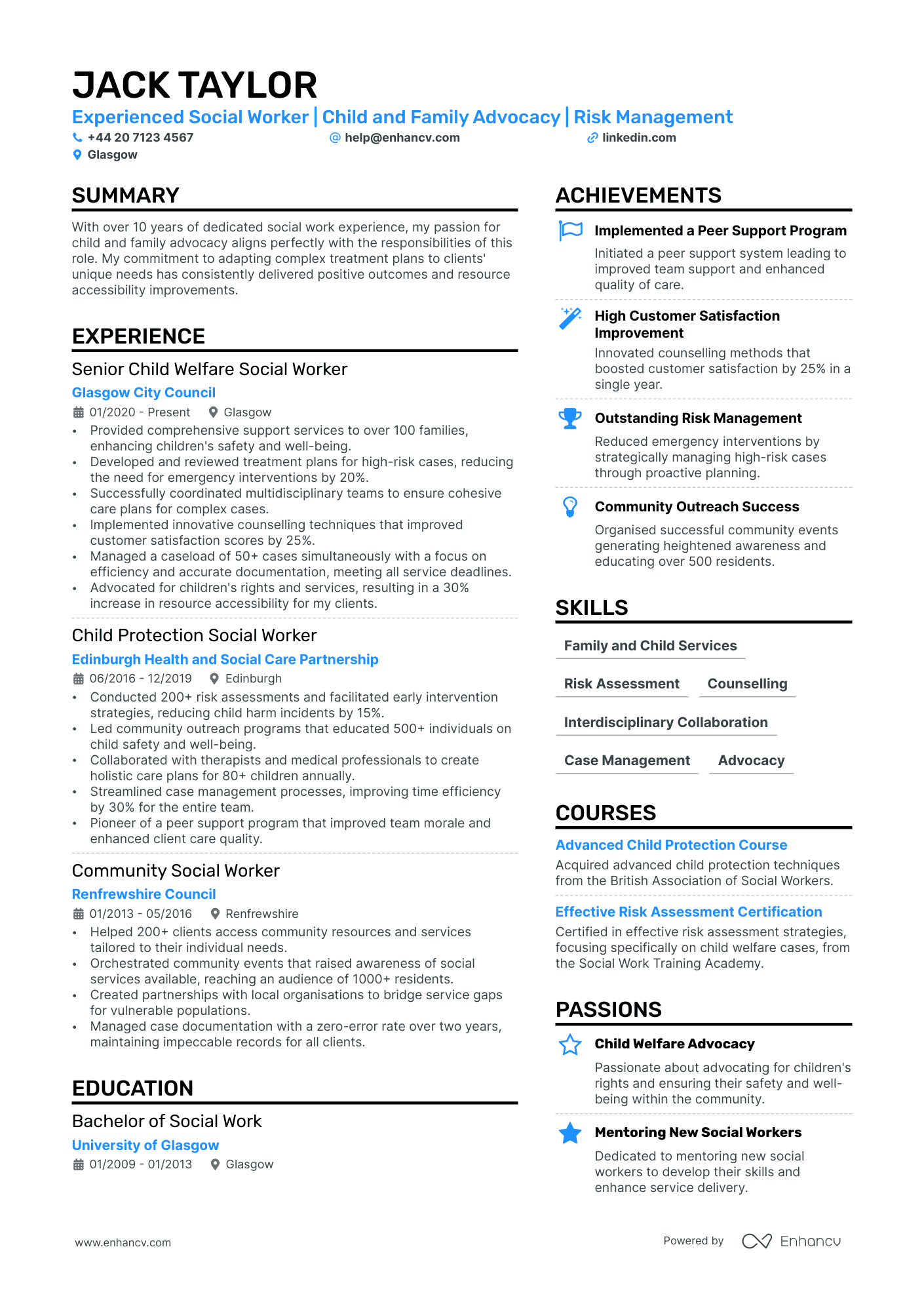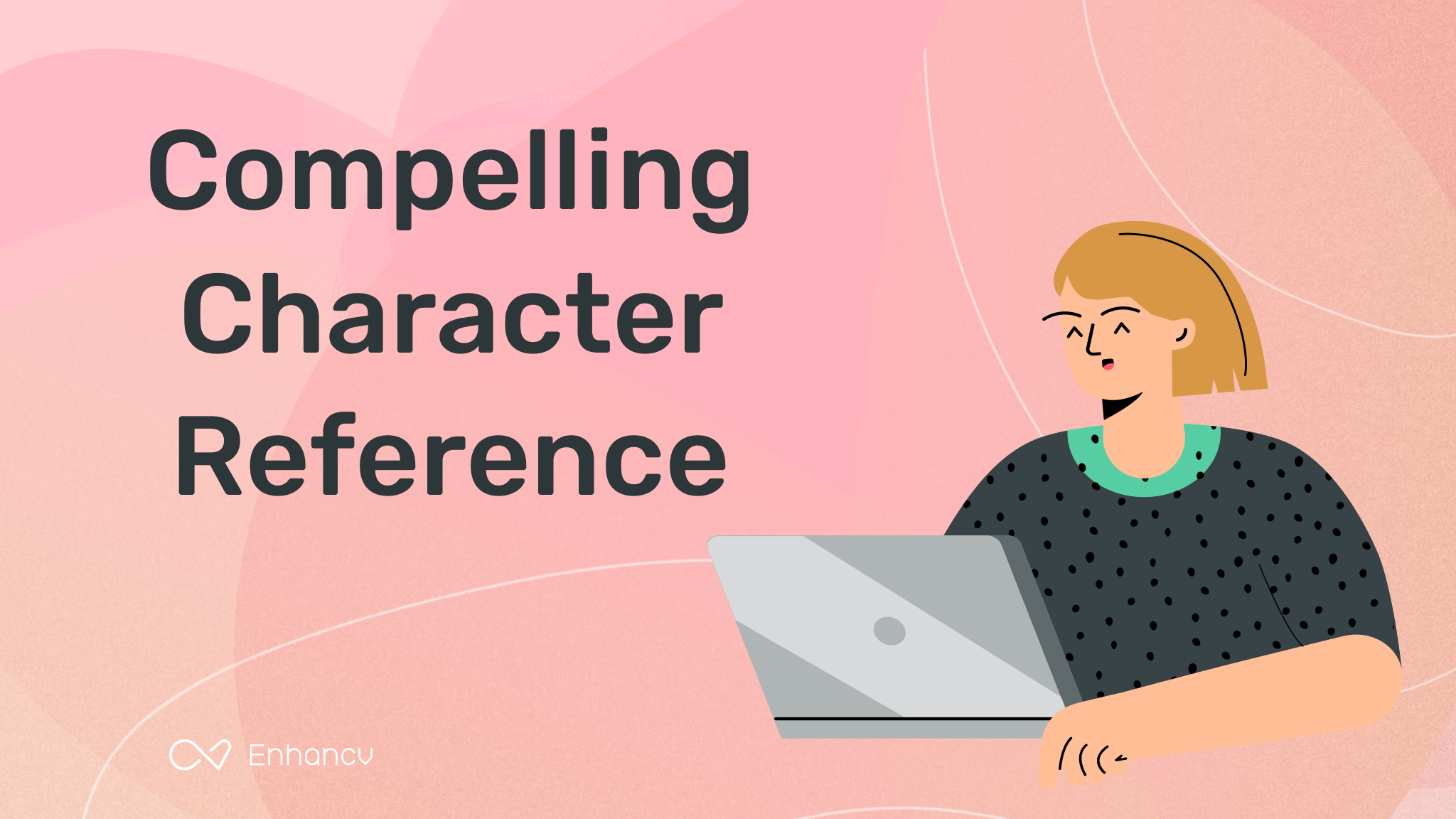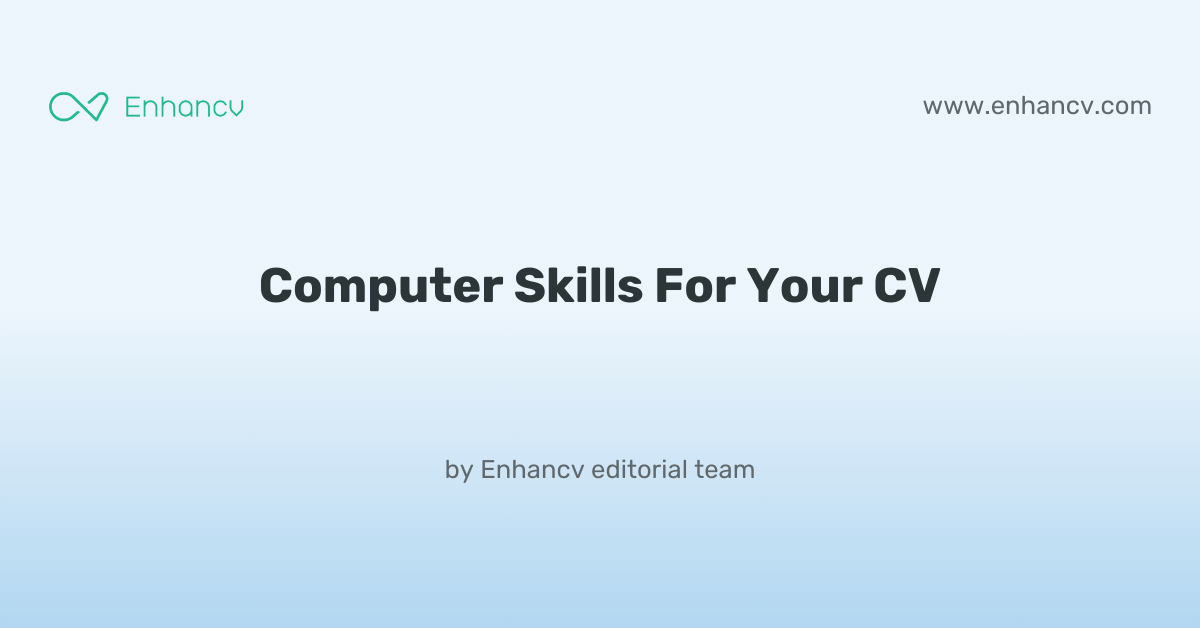One particular CV challenge you may face as a social worker is effectively showcasing your diverse skill set and experience in a concise yet impactful manner. Our guide provides targeted advice and examples to help you articulate your qualifications and demonstrate your unique value to potential employers clearly and effectively.
- Design and format your professional social worker CV;
- Curate your key contact information, skills, and achievements throughout your CV sections;
- Ensure your profile stays competitive by studying other industry-leading social worker CVs;
- Create a great CV even if you happen to have less professional experience, or switching fields.
When writing your social worker CV, you may need plenty of insights from hiring managers. We have prepared industry-leading advice in the form of our relevant CV guides.
Structuring and formatting your social worker CV for an excellent first impression
The experts' best advice regarding your CV format is to keep it simple and concise. Recruiters assessing your CV are foremost looking out for candidates who match their ideal job profile. Your white space, borders, and margins. You may still be wondering which format you need to export your CV in. We recommend using the PDF one, as, upon being uploaded, it never alters your information or CV design. Before we move on to the actual content of your social worker CV, we'd like to remind you about the Applicant Tracker System (or the ATS). The ATS is a software that is sometimes used to initially assess your profile. Here's what you need to keep in mind about the ATS:- All serif and sans-serif fonts (e.g. Rubik, Volkhov, Exo 2 etc.) are ATS-friendly;
- Many candidates invest in Arial and Times New Roman, so avoid these fonts if you want your application to stand out;
- Both single and double column CVs can be read by the ATS, so it's entirely up to you to select your CV design.
PRO TIP
Use bold or italics sparingly to draw attention to key points, such as job titles, company names, or significant achievements. Overusing these formatting options can dilute their impact.
The top sections on a social worker CV
- Professional Summary showcases your commitment and expertise in social work practices.
- Relevant Social Work Experience details your hands-on experience with diverse client groups.
- Education and Qualifications highlight your specialised training and knowledge base in social work.
- Key Skills and Competencies reflect the unique abilities needed to succeed as a social worker.
- Licenses and Certifications demonstrate your professional recognition and legal authority to practice.
What recruiters value on your CV:
- Highlight your experience with diverse client groups to show your ability to handle the varied challenges faced by social workers, including specifics such as ages, backgrounds, or issues such as substance abuse or mental health.
- Emphasise your interagency collaboration skills, mentioning any particular success you've had in working with schools, healthcare providers, or community organisations to support client welfare.
- Detail your proficiency in case management and relevant IT systems, giving examples of how you've effectively managed case loads, maintained accurate records, and utilised software for client benefit.
- Include any specialised training or certifications such as child protection, domestic violence, or crisis intervention to showcase your commitment to continuing professional development within the social work field.
- Illustrate your communication skills, both written and verbal, with examples of reports you have compiled, meetings you have facilitated, or complex information you have successfully conveyed to clients and their families.
Recommended reads:
What information should you include in your social worker CV header?
The CV header is potentially the section that recruiters would refer to the most, as it should include your:
- Contact details - your professional (non-work) email address and phone number;
- Professional photograph - if you're applying hinting at the value you bring as a professional.
Many professionals often struggle with writing their social worker CV headline. That's why in the next section of this guide, we've curated examples of how you can optimise this space to pass any form of assessment.
Examples of good CV headlines for social worker:
- Community Engagement Coordinator | Youth Empowerment | Safeguarding Specialist | BSc Social Work | 5+ Years Experience
- Senior Social Worker | Mental Health Advocate | Crisis Intervention | MA in Social Policy | 8+ Years Expertise
- Child Welfare Officer | Adoption and Fostering | MSc Child Psychology | HCPC Registered | 10 Years Dedicated Service
- Clinical Social Worker | Substance Abuse and Recovery | CBT Certified | MA Social Work | 12 Years Professional Practice
- Social Services Manager | Disability Support Expert | Policy Development | BA Social Sciences | 15+ Years Leadership
- Licensed Social Worker | Elderly Care Specialist | End-of-Life Planning | MSW | 6 Years Commitment
Your social worker CV introduction: selecting between a summary and an objective
social worker candidates often wonder how to start writing their resumes. More specifically, how exactly can they use their opening statements to build a connection with recruiters, showcase their relevant skills, and spotlight job alignment. A tricky situation, we know. When crafting you social worker CV select between:
- A summary - to show an overview of your career so far, including your most significant achievements.
- An objective - to show a conscise overview of your career dreams and aspirations.
Find out more examples and ultimately, decide which type of opening statement will fit your profile in the next section of our guide:
CV summaries for a social worker job:
- With over a decade of dedicated service in child and family social work, I bring a wealth of case management expertise, skilled in therapeutic intervention strategies and adept at navigating complex family dynamics. Recognised for spearheading a community integration program that reduced re-homing rates by 40%.
- Armed with 8 years of experience in mental health support, I excel in crisis intervention and the development of personalised care plans. Instrumental in launching a peer support network that increased patient self-sufficiency by 50%, demonstrating a steadfast commitment to client empowerment.
- Former healthcare professional transitioning into social work, bringing 5 years of experience in patient advocacy and a profound understanding of medical and psychological terminology. Led a cross-functional team to improve patient discharge procedures, reducing readmission rates by 25%.
- Experienced educator eager to pivot into social work, offering strong interpersonal skills and an extensive background in youth mentoring. Successfully established a school-wide anti-bullying program that decreased reported incidents by 30% and fostered a safer learning environment.
- As a recent graduate with comprehensive knowledge in social welfare policies and a fervent desire to contribute to community development, I seek to apply my academic insights and volunteer experience in family support services to further develop my professional capabilities.
- Embarking on a career in social work, I aim to leverage my psychology degree and hands-on volunteer experience with at-risk adolescents to advocate for mental health and foster positive outcomes in a dynamic professional setting.
More detailed look into your work history: best advice on writing your social worker CV experience section
The CV experience is a space not just to merely list your past roles and responsibilities. It is the CV real estate within which you could detail your greatest accomplishments and skills, while matching the job requirements. Here's what to have in your experience section:
- Prove you have what the job wants with your unique skill set and past successes;
- Start each bullet with a strong, action verb, and continue with the outcome of your responsibility;
- Use any awards, nominations, and recognitions you've received as solid proof of your skill set and expertise;
- align your experience with the role responsibilities and duties.
For more help on how to write your CV experience section, check out the next section of our guide:
Best practices for your CV's work experience section
- Conducted comprehensive assessments of clients' needs to develop tailored support plans, ensuring alignment with legal frameworks and ethical standards in social work.
- Collaborated with multidisciplinary teams, including healthcare professionals, educators, and counsellors, to provide coordinated care for clients and their families.
- Managed caseloads efficiently, with attention to detail in documentation and adherence to data protection legislation, to deliver timely interventions and follow-up.
- Advocated on behalf of clients to access community resources, secure housing, and obtain benefits, highlighting strong negotiation and communication skills.
- Implemented evidence-based interventions to support clients dealing with mental health issues, substance abuse, domestic violence, or homelessness.
- Facilitated support groups and workshops, demonstrating expertise in fostering group dynamics and enabling peer support for diverse client populations.
- Maintained up-to-date knowledge of social policy changes and their implications for service delivery, ensuring practice is current and responsive to societal needs.
- Provided crisis intervention and support during emergencies, exhibiting calmness under pressure and the ability to make critical decisions with compassion.
- Engaged in ongoing professional development and reflective practice to enhance the quality of service delivery and contribute to the wider knowledge base of social work.
- Orchestrated a community mental health programme catering to over 200 individuals with collaborative care strategies, resulting in a 30% improvement in patient-reported mental health outcomes.
- Led a multidisciplinary team to implement a child welfare initiative that reduced case resolution times by 25% through the application of solution-focused brief therapy techniques.
- Enhanced family support services by training staff in culturally sensitive practices, increasing positive feedback from service users by 40%.
- Conducted over 500 home visits for child protection cases, providing crisis intervention and referrals to appropriate agencies for additional support.
- Developed and delivered a successful grant application for £100,000 to support a new foster care programme aimed at older children.
- Initiated a collaboration with the local police department, improving response times to critical cases by 35%.
- Led a task force to tackle substance abuse that connected over 150 individuals with recovery services and reduced local drug-related crime rates by 20%.
- Established a peer mentoring program for at-risk youth, seeing a retention rate of 90% and overall improvement in school attendance of 15%.
- Implemented a program evaluation system that tracked service user progress and informed policy changes, securing continued funding of approximately £250,000 annually.
- Implemented an innovative case management system that reduced paperwork by 50% and increased time spent with clients.
- Provided specialised support for over 80 individuals suffering from severe mental health issues, facilitating their integration into community-based care settings.
- Established a monthly workshop series for the family members of service users which fostered understanding and support for mental health challenges within the community.
- Spearheaded a collaborative project with local law enforcement to address the needs of domestic violence survivors, resulting in the establishment of a 24-hour crisis hotline.
- Facilitated over 300 group therapy sessions specializing in trauma, helping participants to regain a sense of personal agency and resilience.
- Pioneered a data-driven approach to case allocation which improved service delivery efficiency by 20%.
- Coordinated with local housing agencies to secure stable accommodation for over 100 homeless individuals each year, enhancing their opportunity for social reintegration.
- Developed and implemented an innovative life-skills program which saw a participant job placement rate increase by 25% within the first year.
- Managed a budget of £150,000, ensuring efficient allocation of resources for maximum impact on service user outcomes.
- Collaborated with school staff to provide targeted behavioural interventions for over 60 students annually, decreasing school truancy rates by 18%.
- Facilitated the launch of a community-based after-school program that offered tutoring and recreational activities to improve the well-being and academic performance of children in disadvantaged areas.
- Successfully advocated for additional local government funding, securing an extra £50,000 per year for expansion of youth services.
- Managed care plans for elderly clients with dementia, resulting in a 20% increase in reportable quality-of-life metrics over a two-year period.
- Coordinated with healthcare providers to implement a holistic health approach, cutting hospital readmission rates for our elderly clientele by half.
- Developed a volunteer program to provide companionship to isolated older adults, effectively doubling community engagement within the program's first year.
What to add in your social worker CV experience section with no professional experience
If you don't have the standard nine-to-five professional experience, yet are still keen on applying for the job, here's what you can do:
- List any internships, part-time roles, volunteer experience, or basically any work you've done that meets the job requirements and is in the same industry;
- Showcase any project you've done in your free time (even if you completed them with family and friends) that will hint at your experience and skill set;
- Replace the standard, CV experience section with a strengths or achievements one. This will help you spotlight your transferrable skills that apply to the role.
Recommended reads:
PRO TIP
Include examples of how you adapted to new tools, environments, or work cultures, showing your flexibility.
Mix and match hard and soft skills across your social worker CV
Your skill set play an equally valid role as your experience to your application. That is because recruiters are looking for both:
- hard skills or your aptitude in applying particular technologies
- soft skills or your ability to work in a team using your personal skills, e.g. leadership, time management, etc.
Are you wondering how you should include both hard and soft skills across your social worker CV? Use the:
- skills section to list between ten and twelve technologies that are part of the job requirement (and that you're capable to use);
- strengths and achievements section to detail how you've used particular hard and soft skills that led to great results for you at work;
- summary or objective to spotlight up to three skills that are crucial for the role and how they've helped you optimise your work processes.
One final note - when writing about the skills you have, make sure to match them exactly as they are written in the job ad. Take this precautionary measure to ensure your CV passes the Applicant Tracker System (ATS) assessment.
Top skills for your social worker CV:
Case Management
Psychosocial Assessments
Crisis Intervention
Knowledge of Social Work Theories
Child and Adult Safeguarding
Mental Health Support
Substance Abuse Counseling
Group Facilitation
Community Outreach Coordination
Familiarity with Social Welfare Policy
Empathy
Communication
Active Listening
Problem-Solving
Adaptability
Interpersonal Skills
Organization
Critical Thinking
Advocacy
Stress Management
PRO TIP
Order your skills based on the relevance to the role you're applying for, ensuring the most pertinent skills catch the employer's attention first.
CV education and certificates: your academic background as proof of your skill set
A common misconception about your social worker CV education is that you only need it, if you have less professional experience. That is completely false. The CV education section serves to back up your technical (and sometimes personal) capabilities, fill in gaps in your work history, and show you have the initial industry background and know-how. When creating your education section:
- List your degrees in the reverse chronological order, starting with the most recent (and relevant) ones first;
- Include your degree and university names, start and graduation dates. It's optional to also denote you received a "First-Class Honours" for diplomas that are more relevant to the role;
- Curate your relevant university coursework, projects, or thesis work if you happen to have less professional expertise and need to integrate more job keywords and skills.
Your professional qualifications don't need to stop at your academic background. It's advisable to also select up to three of your most noteworthy (and relevant) industry certificates and feature them in a dedicated section. Once more, include the certificate name, the institution that issued it out, and the date you obtained it on. You could feature both hard skills and soft skills certificates, as in the examples below:
PRO TIP
Focus on describing skills in the context of the outcomes they’ve helped you achieve, linking them directly to tangible results or successes in your career.
Recommended reads:
Key takeaways
Impressing recruiters with your experience, skill set, and values starts with your professional social worker CV. Write concisely and always aim to answer job requirements with what you've achieved; furthermore:
- Select a simple design that complements your experience and ensures your profile is presentable;
- Include an opening statement that either spotlights your key achievements (summary) or showcases your career ambitions (objective);
- Curate your experience bullets, so that each one commences with a strong, action verb and is followed up by your skill and accomplishment;
- List your hard and soft skills all across different sections of your CV to ensure your application meets the requirements;
- Dedicate space to your relevant higher education diplomas and your certificates to show recruiters you have the necessary industry background.
